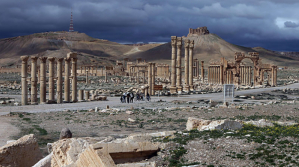
The fight against the militants Islamic State of Iraq and Syris (ISIS) has entered a more difficult phase after the terror group captured of al-Tanf - known as al-Waleed in Iraq, the last Syrian government-controlled border crossing between Syria and Iraq, BBC reporting quoting sources from the Syrian Observatory for Human Rights (SOHR).
With the fall of al-Tanf, ISIS, the Islamic State, also called ISIL, has expanded its territory that now covers more than 95,000 sq km (36,679 sq miles) of Syria, or half of that country's land mass. ISIS is now in control of the provinces of Deir al-Zour and Raqqa and have a strong presence in Hasakeh, Aleppo, Homs and Hama, SOHR said.
The capture of al-Tanf to ISIS follows the group's takeover of the ancient Syrian city of Palmyra on Thursday. United Nations Educational Scientific and Cultural Organization (UNESCO) warned that the ancient ruins at Palmyra since the Islamic State took full control of the city after Syrian forces loyal to President Bashar al-Assad retreated from the ISIS's rapid offensive.
The UN has expressed concern that the ruins in Palmyra would suffer the same fate as the Assyrian city of Nimrud and the statues in Iraq's Mosul Museum which the Sunni Muslim jihadists destroyed when they captured the cities, reported CNN.
The Palmyra ruins are included in the UNESCO World Heritage Site list and were described as having "stood at the crossroads of several civilizations," with its art and architecture a fusion of Greek, Roman and Persian influences.
All across the globe, historians and activists have issued condemnation over the fall of Palmyra over ISIS. An activist using #SavePalmyra, tweeted, "Am screaming #SavePalmyra out of sheer despair. as I dont know who this scream is directed to or what anyone can do."
Many historians consider Palmyra as playing an important role in the world's history, and described it as a "caravan of oasis" even before the Romans gained control of the city in the mid-first century. Palmyra was a vital trade route that linked the Roman Empire to Persia, India and China during that era, the report said.
Tom Holland a novelist and historian from Britain, wrote about Palmyra and describing the city as "an extraordinary fusion of classical and Iranian influences intermixed with various Arab influence as well." He added that the destruction of Palmyra would be a great tragedy for the world and not just for the Syrian people.
Holland went on to say, "Mesopotamia, Iraq, Syria, this is the wellspring of global civilization. It really couldn't be higher stakes in terms of conservation."
ISIS militants gained full control of Palmyra on Thursday after Syrian forces completely abandoned the city. Sketchy reports indicated that more than 100 Syrian soldiers have died defending Palmyra from the ISIS offensive.
There was no indication that Syrian forces are planning to launch an offensive to retake Palmyra as they focus their defenses in the capital city of Damascus.
Residents of Palmyra were asking why the Syrian government, as well as the U.S. led coalition waging a parallel air war against the ISIS, did not bombed the militants position and allowed the group to capture the city, said the New York Times.
Many of the trapped residents are cowering in fear and hiding in their basements, afraid of retaliation from the ISIS and also terrified they might be caught in the anticipated air strikes on the city to flush out the jihadists.
"I can foresee the regime bombarding the town massively, especially after the huge loss among its soldiers," Khaled al-Homsi, a member of the committee that organized anti-government protests in Palmyra in 2011 was quoted as saying. Al-Homsi joined the protests against al-Assad's regime, unaware that their actions would lead to a full-blown civil war and spawn a group like ISIS.
Meanwhile, the United Nations said it received reports from "credible sources" that Syrian forces prevented civilians from leaving Palmyra as they retreated ahead of its fall to the hands of the ISIS terrorists.
A report by BBC said that the UN has expressed concern over the reports and said hundreds, if not thousands of civilians, remain trapped in Palmyra, and are facing threats from the ISIS jihadists.
In Washington, White House spokesman Josh Earnest acknowledged that the fall of Palmyra, and Ramadi a few days earlier, are a major setback for the U.S.-led efforts against the ISIS militants. But he said President Barack Obama believes that the U.S. is still not losing the war against the terror group.
He told BBC, "Until we're able to build up local forces on the ground in Syria who can take the fight to Isil [IS] in their own country, this is going to continue to be a difficult challenge." Earnest added that the fight against the ISIS was "not going to be solved overnight".






